When it comes to the internal matters of India, particularly those that have elevated sensitive values, the US, despite being a close ally, has developed a habit of producing sound bites which are not liked by New Delhi, yet they are intentionally made to keep the world’s largest democracy on toes.
This was clearly seen in the context of the Citizenship (Amendment) Act, 2019, which India implemented after notifying the rules on March 11 this year. The CAA grants citizenship to persecuted minorities belonging to Hindu, Sikh, Buddhist, Jain, Parsi and Christian communities from Pakistan, Bangladesh and Afghanistan who have entered India on or before December 31, 2014.
But on March 14, the US State Department expressed its concern on the notification of CAA, stating it is closely monitoring the implementation of the law. Even as the Ministry of External Affairs rejected the State Department’s statement while terming it as “misplaced, misinformed, and unwarranted”, US Ambassador to India, Eric Garcetti, speaking at the India Today Conclave on March 15 said America cannot give up on principles of religious freedom and equality which are cornerstone of democracy.
Miffed by the American Ambassador’s statement, External Affairs Minister S Jaishankar said, “I have principles too, and one of them is obligation to people who were let down at the time of Partition.” He further added, “I am questioning their understanding of our history. If you hear comments from many parts of the world, it is as if the Partition of India never happened, there were no consequential problems which the CAA is supposed to address.”
In essence, the CAA is seen as anti-Muslim by the US, despite several clarifications by India to counter such perceptions among American authorities. The government also issued a press statement asserting that Indian Muslims need not have to fear the CAA as it will not affect their citizenship and is unrelated to the community which enjoys equal rights as Hindus. Styled in a question-and-answer format, the press statement issued by the Ministry of Home Affairs on March 12 said, “Indian Muslims need not worry as CAA has not made any provision to impact their citizenship and has nothing to do with the present 18 crore Indian Muslims, who have equal rights like their Hindu counterparts.”
Proponents of CAA say that Americans have forgotten they had granted US citizenship to Christians and Jews from the former Soviet Union as well as some individuals from Laos, Cambodia, and Vietnam in 1990 under the Lautenberg Amendment. Then in 2004, they brought in the Specter Amendment to provide American citizenship to persecuted minorities like Bahai, Armenian and Assyrian Christians, and Jews from Iran.
In Europe, in 2017, Paris granted citizenship to ex-Senegalese soldiers who fought for France in World War II. Britain allows people from South Africa, Australia, New Zealand to take the UK’s citizenship provided they are a direct descendent of British nationals.
This model, called ‘the ancestry model’, is followed by countries such as France, Spain, Portugal, Ireland, and others as well. For example, Italy allows citizenship by descent up to the third generation or more. In Poland, one can get citizenship through ancestry if he has a parent, grandparent, great-grandparent, or earlier descendant who was born in Poland and lived there after 1920. Hungary grants citizenship on two conditions: First, one has a direct ancestor who was a Hungarian citizen; second, he or she has a basic knowledge of Hungarian language.
The UN, the Council of Europe, and the European Union, terming it discriminatory, have criticized these countries for their ethnically selective process of granting citizenship. Yet they have not abandoned the practice of granting citizenship through ancestry. But this time, apparently on account of the Ukraine war and Israel’s war against Hamas and their consequent impact on international geopolitics, European countries have desisted from going along with the US in criticising India over the CAA as they did in 2020.
Four years ago, the European Parliament was set to debate and vote on a resolution against the CAA, but it differed after getting a direct perspective about India’s citizenship law from EAM S Jaishankar. There was also a division among EU members on the issue of the CAA as France distanced itself from attacking India on the citizenship law. Rather it termed it as “India’s internal political matter”.
This time, while there have been no comments from the European countries on the CAA, Western dailies and news outlets have also been sporadic in their coverage of the citizenship law. BBC, Reuters, and The Guardian reported news about the implementation of the law. Except for BBC whose reportage on the CAA on March 12 appeared to be a bit sharp as it wrote in the headline, “CAA: India to enforce migrant law that excludes Muslims”, the coverage of the law by other Western news outlets was more or less balanced.
German public broadcaster DW which was markedly vociferous and loud in its reportage on India’s citizenship law during 2019 and early 2020, has so far been irregular in giving space to news reports on the CAA this time. It was nonetheless caustic in its reportage after India notified the law’s implementation a week ago. “India’s Citizenship Amendment Act: Why is it controversial?” a DW report said in its headline on March 13, highlighting opposition leaders’ concern on the timing of its implementation and rights activists’ fear that it will undermine the country’s secular constitution.
Overall, lack of strong and coherent opposition to the CAA and the government’s calculated move to dispel any misconception among Muslims over the citizenship law have so far worked well in diminishing any attempt to generate widespread negative sentiments against the law in the country. In the meanwhile, India has made it clear that its “Constitution guarantees freedom of religion to all its citizens and that there are no grounds for any concern over treatment of minorities”.

